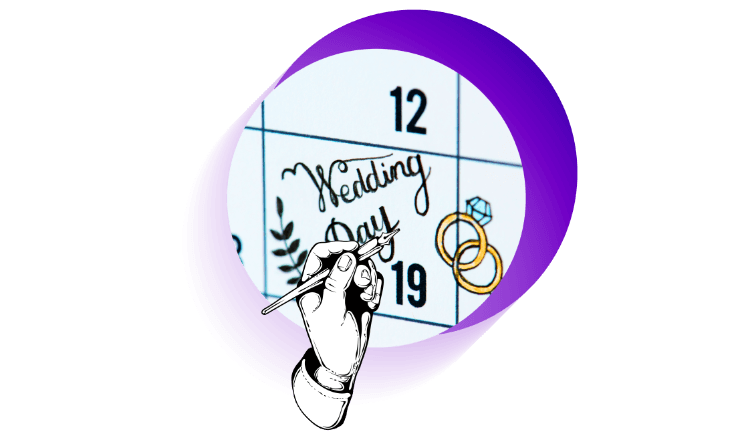
After the initial buzz of the proposal wears off, the reality of wedding planning sets in. The road from “Yes” to “I do” is much longer and more complicated than most couples think, even for simple low-key weddings.
Most wedding experts claim that it takes between 6 and 12 months to plan a wedding, no matter the size. This amount of lead time is needed to make a budget, book vendors, invite all the guests, and prepare all the legal matters, like fulfilling the marriage license requirements.
At the start, the list of to-dos might seem daunting, but here is a step-by-step plan that any couple can follow to get on the right track and plan their perfect wedding.
While it is romantic to think that love conquers all when it comes to weddings, money matters, and weddings are expensive. The average cost of a wedding in 2021 was $28,000, and even those who just want to rent a simple venue for friends and family with as few frills as possible will pay an average of $10,500 just to rent the space.
Whenever you start planning your wedding, the very first thing you must do is determine your budget. Joyce Rojas, a financial advisor, says determining your budget “is an exercise that both of you will need to tackle and an in depth discussion of your current and future finances” will be a great foundation for your lives together. To do this, you must first figure out who will be contributing to the wedding fund.
Traditionally parents pay for most if not all of the wedding; however, most modern couples prefer to cover the wedding costs themselves. 68% of couples report paying for some or all of their ceremony, and parents pay 52% of wedding costs on average. Parents are more likely to pay for big-ticket items like venue and catering, and couples usually pay for things like bands, photographers, and any unique extras they might like.
However, weddings aren’t just a ceremony. There are invitations, showers, the rehearsal dinner, after wedding brunch, and any other expenses that are often overlooked but essential to consider when determining a budget for your wedding.
Determine who will be contributing to the wedding fund and how much they will be giving. Do your best to get as precise a number as possible. You can then decide how best to spend it on your perfect wedding.
After deciding on a budget, the next item to be done as quickly as possible is choosing a date and location for a wedding. This is much more complicated than just picking a day and a place you like. There are peak and off-peak wedding seasons, which add to the challenge of finding venues and booking vendors.
For most couples, the date of a wedding comes down to one of two times, either a special date that has meaning or a day that is expected to have nice weather in the season they like most.
Some families might have a day when many couples have married in the past, and some couples will want to keep this tradition going. Some other couples prefer days that are special, perhaps the anniversary of their first date or the day they met. Other couples just enjoy a specific season and try to choose a date with historically good weather or a date when their preferred venue is available.
If you are considering a religious wedding, check for rules that might preclude certain dates. Roman Catholics, for example, have complicated rules about getting married on Holy holidays like Easter, so consult a religious leader before picking a date.
Traditionally, weddings were held in the bride’s hometown. However, with more families living apart and the rise of destination weddings, finding a place that works well for everyone can be a headache.
This is a time when open and honest communication is best. Talk to the people you want to invite and feel out what would be best for them. If you want a destination wedding in Hawaii, but no one in your family can afford it, that’s not a good idea. Conversely, if most people you want to invite live in one city, that is usually your best choice.

Once you know how much money you have to work with and a date and location, you need to choose a theme, style, or vibe for your wedding. This can be overwhelming because there are thousands of styles and most couples feel it is important to find one that matches their personalities.
Here are some ideas that might help you choose a good theme for your wedding:
Many couples like to make a Pinterest board or look at style guides together to pick out ideas they both like, then bring them together to create something unique and personalized.

Choosing who will be a part of your wedding party is a crucial decision you should make at least a few months out; half a year if possible. Think of your wedding party as a combination of a group of your best friends and family and a gang of people to help you with the ceremony.
Choose people you love, who you are close with, and who will be reliable on the wedding day. You might have a best friend you love dearly, but they are a bit flaky; perhaps choosing a more reliable friend is better.
There is no good way to decide amongst friends and family who makes the cut. Talk it over with your partner to make sure you have the same number and that the lists work well together. If you have too many people you want, make some ushers or participants in other parts of the ceremony or reception.

Most wedding experts recommend selecting your vendors 5 to 6 months before your wedding, but the earlier you can do it, the better. Many vendors can only accommodate one wedding per date, and some dates are more popular than others.
Go to different vendors to taste, see, experience, and price check. Find which one is the best within your budget and book them as soon as possible.
There is no special way to decide who to use or which vendors are best. This will be a decision you make as a couple, but it shouldn’t be a blind decision. It is okay to ask for references to ensure the vendors will do as promised.
The guest list should be the last thing you plan for your wedding, but should still be prepared well in advance, 4 to 6 months if possible, particularly if many guests need to travel to the wedding.
The guest list for any wedding is the product of negotiation between the partners and their families, and these discussions can get heated easily. The best way to do it is to give each person or family a set number of invitations; they can choose who they want to invite.
It is also important for couples to lay ground rules for those who can and can’t be invited.
Weddings are wonderful, but can be stressful. The best way to have the perfect day and not stress out too much is to make sure everything is planned well in advance. Start planning the day after the proposal, and make sure everything is set by the 4-month out mark, and you’ll be sure to set the stay for a perfect nuptial day. However, with more couples staying engaged longer, it can actually be a great tactic to plan and save up for your wedding!
Check out the latest blogs for more tips and information that The Groom Club has to offer!